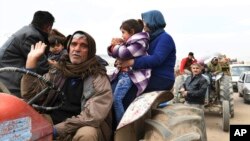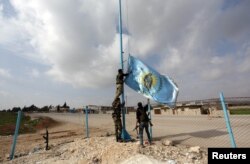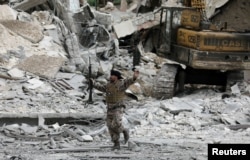Questions about the fate of Syrian refugees in Turkey are emerging as its forces in Syria's Afrin province fight a Kurdish militia linked to a long-running insurgency within Turkish borders.
Ankara has said the goal of its military offensive is to secure the Turkish border against terrorist threats posed by the Syrian Kurdish militia the YPG, which the United States supports in the fight against Islamic State militants.
But a second goal is emerging: the return of Syrian refugees.
In recent weeks, Turkey's political leadership has been saying that with victory in the operation, hundreds of thousands of Syrian refugees could be sent to Afrin.
"We are not in a position to continue hosting 3.5 million refugees forever," said Turkish President Recep Tayyip Erdogan in a speech to village and provincial leaders. "We'll solve the Afrin incident, we'll solve Idlib, and we would like our refugee brothers and sisters to return to their own country," added Erdogan. Idlib borders Afrin and is one of the last remaining enclaves where Syrian rebel forces backed by Turkey are based.
Ankara has suggested between 350,000 to 500,000 refugees could be sent to Afrin.
Until recently, political leaders made few references to returning refugees. Instead, the government chose to use its refugee policy to enhance its humanitarian credentials, while at the same time castigating European countries for failing to match the country's humanitarian commitments.
The prospect of even citizenship to millions of Syrians was once touted. "Turkey is also your homeland...We are going to help our Syrian friends in offering them the chance, if they want it, to acquire Turkish nationality," Erdogan said in July 2016. But in a rare case of Erdogan misreading public sentiment, studies and opinion polls indicate strong opposition to his Syrian refugee policy.
"You look at survey upon survey...Turks resent Syrians. Up to 80 percent of survey participants express a negative opinion against Syrians," points out analyst Atilla Yesilada of Global Source Partners. Yesilada said that sentiment "is understandable, for the same reason Germans don't like Muslim refugees, Turks don't like Arab refugees. There is a mistaken impression they take jobs, they undermine social order."
Refugee policy
In a politically polarized country, a rare consensus is found over opposition to refugees. A recent comprehensive study by Istanbul's Bilgi University recorded two-thirds of respondents, including 45 percent of Erdogan voters, said the government's policies toward Syrians are wrong.
The government has spent more than $30 billion in hosting refugees, including providing health and education, such as at the university level, something not available for Turks. Additionally, 75 percent of respondents said Turkish and Syrian communities could not live in peace.
In the past year, numerous clashes between Turks and Syrians have been reported across Turkey. Last July, more than 100 Syrian and Afghan families were evacuated from an Istanbul suburb, following two days of violence after Syrian youths allegedly killed a Turkish teenager.
With general and presidential elections due within 18 months, and surveys revealing the presence of Syrian refugees and terrorism as key issues of voter concern, analysts suggest the ongoing military offensive against the Kurdish militia in Afrin offers Erdogan an opportunity.
"So whatever territory Turkey occupies, it is going to be used to send back the Syrian refugees, largely Sunni Arabs. There is going to be ethnic dilution; it's a lose, lose for Kurds," said analyst Yesilada. "It's a very neat solution; as with all neat solutions, it's clever, but not ethical or moral."
Relocation
Turkey's main pro-Kurdish party has accused the government of seeking to change the demographic makeup ofthe predominantly Kurdish Syrian Afrin enclave. It is a policy the HDP says has been used in the past against Kurds living in the region.
Erdogan has dismissed such accusations, maintaining that he merely wants to right an injustice. "The whole issue is this: 55 percent of Afrin is Arab, 35 percent are the Kurds who were later relocated, and about 7 percent are Turkmen. [We aim] to give Afrin back to its rightful owners," the Turkish president said at a rally in the Bursa province.
With the majority of Syrian refugees dispersed across Turkey and many already carving out a life for themselves, questions are being raised as to whether talk of the mass return of Syrians is just electioneering by Erdogan.
"It's clear this kind of talk, is rhetoric, is intended for internal consumption for elections. It's a pipe dream; nothing of this kind [will] happen, for a number of reasons. Will these [Syrian] people - would they like to go and live there? [Afrin]. The Kurds will object to it, the Syrians will object to it, Russians will object it, the Iranians will object to it, the Arabs will object it, the entire world will object to it," said political scientist Cengiz Aktar. "What Erdogan may do, he may relocate [pro-Turkish] Arab [militia] proxies, a kind of border force inside Syria; this is a very old tactic."






